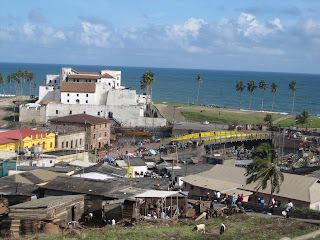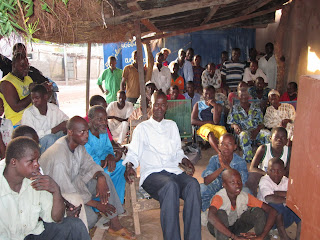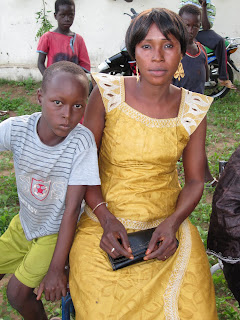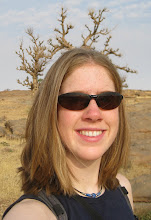Peanuts are an interesting crop here because the women are primarily responsible for growing them. All other food staples (millet, sorghum, rice, sweet potatoes, etc.) are grown by men. I'm often told that's the man's main responsibility in a marriage - to provide food for their family. It's unfortunate that women are put in charge of obtaining any (and often all) of the more vitamin-rich food (fruits, veggies, even protein-rich peanuts)...men don't seem to view that as their responsibility in my village. Okay, let's put feminism aside for a moment. Women are responsible for growing and processing peanuts. Many break up their fields by hand (men are generally busy with the few cow-driven plows until long past the time that peanuts need to be planted). Women generally plant a 1/2 to full hectare of peanuts to provide extra nutrition for their family and an extra source of income when they prepare and sell small parts of the harvest.
The peanut plant itself is quite interesting. It has a yellow flower, and once pollinated, the plant sends shoots into the ground. If all goes well and the rains don't end early, each of these shoots will produce a mature peanut fruit (found underground) by the end of the growing season. This is the same peanut that we know and love in the United States. Sometimes, Malians seemed shocked to learn that the United States is one of the biggest producers of peanuts in the world...and even more shocked to find out that we use machines for most of the planting and harvesting. Here in my village, the ground has generally dried up when it's time to harvest the peanuts. It is a man's job to break up the ground and dig up the peanuts with a daba. I hate to admit it, but this really is a man's job. I tried digging some peanuts up in my host family's field, and found that half of the peanuts on each plant were still in the ground. After a short time, I figured out that I was hindering their progress more than helping, so I went to help the women with their job of gathering all of the harvested peanut plants together.
Mamidou and Momo harvesting peanuts:

My host brother, Mamidou, and his father Momo.

My host Mom, Nba, gathering peanut plants together to dry in the sun.

Nba, my host Mom, who cooks me lunch every day:

More of my host family: Yacouba, Dabi and Hawa:

My other host mom (Momo's wife), Gundo, with her daughter Nandi and newborn baby girl.

My host sister Hawa and her little baby brother, Papa, gathering peanuts.

Peanuts! I was told by my language tutor long ago, that I would learn how to cook peanuts over one hundred different ways from living in a Malinke village. I would say it's pretty close to that.

My other host Dad, Nfa, preparing tea in the fields. He is Nba's husband.

This year, as a part of the seed trials conducted in my village, I gave 10 women a new, drought-resistant variety of peanuts. They planted this variety next to their own, local variety. I would call the trials a semi-success because this new variety seemed to have greater insect damage and a much lower yield than the local variety. Even so, the new variety matured almost 2 weeks earlier than the local variety...so the new variety has some potential as far as a climate-changed future with more frequent drought periods and shorter rainy seasons. Even so, the new variety wasn't good enough for my work partner to save for planting next year. She roasted the peanuts up the other day and shared them with me as a snack. Sometimes, I question the value of my efforts here...especially when they just get eaten up.
This is Kadia, one of the women who received the drought-resistant peanut variety. She and I worked together to prepare her peanut fields for planting.


Partly because I'm Malinke (we're known for eating and loving peanuts more than any other ethnic group in Mali - at least joking cousin-wise), partly to be able to say I was farming peanuts when asked (at the beginning of rainy season, I was asked 5-10 times per day whether or not I was growing one of the main staple crops), and partly to be in some sort of solidarity with the women, and to understand more about their work, I grew peanuts in my garden during the rainy season. I grew three beds of peanuts, a miniscule area compared to the areas grown by each woman here. It was really fun for me to go through the whole process of growing peanuts, from planting to harvesting. So fun,that I decided to go all the way to processing the peanuts into peanut butter - a main sauce ingredient in our village. Here is the peanut butter process:
My garden early in the year, when the peanut plants were very young. I had worked on weeding half of the plot the morning this picture was taken.

Here is one of my peanut beds, just before harvesting:

And, the yield from the above bed. I had a huge smile on my face the day I harvested these, because I considered these peanuts one of the first real successes I've had in my garden.

After harvesting, I dried the peanuts in their shells for 3-4 days in the sun, then worked on shelling the peanuts by hand. This is an important social activity in my village - you can bring a bucket of peanuts anywhere to meet with a group of women and spend a couple hours shelling peanuts together. My young host brothers and sisters also liked to help out during their breaks from school. Once shelled the real fun of making peanut butter began. The first step is to roast the peanuts (ka tiga jiran). Here are the peanuts ready to be roasted, followed by me and my host Mom, Gundo, roasting the peanuts.


Next, you rub the skins off of the roasted peanuts, and shake the skins off using the wind (ka tiga fe). I'm no good at this step, so my host Mom did it all:

Next you pound the peanuts (ka tiga susu):

And, take them to the manual grinding machine to process them into delicious peanut butter. If you have a lot of peanuts, you can take them to the gas-powered machine to process them into a much smoother, delicious peanut butter, which is closer to what we eat in America. Without the added salt and sugar anyway.

Yum, delicious peanut butter. I put it in my oatmeal every morning, or make peanut butter, honey, banana sandwiches. These two uses are considered weird by my neighbors, who add peanut butter to their okra, leaf, or straight peanut butter sauces, to be eaten with millet or rice. To make sure people didn't think I was too strange, I made peanut butter, honey, banana-sandwiches for everyone who helped me the other day...they all loved it. If you want to learn more about the amazing peanut plant, here is yet another widipedia link...







































